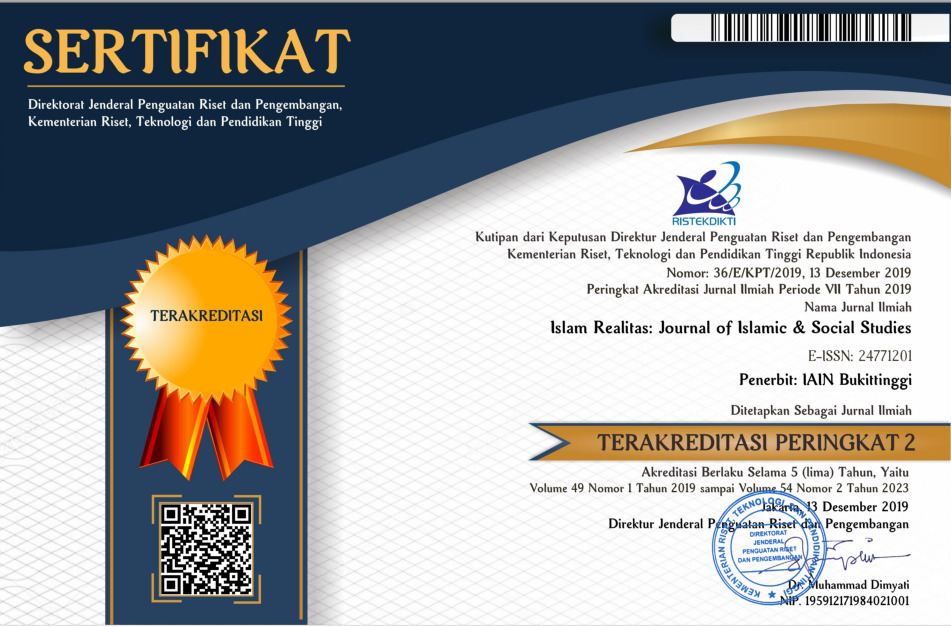Interreligious Peacebuilding and Minority Problems in Islamic Mystical Teachings
DOI:
https://doi.org/10.30983/fuaduna.v7i1.6015Keywords:
Abstract
Differences are a necessity that humans cannot deny, including differences in matters of belief and religion. Humans living side by side in a community should be able to create a harmonious, safe and peaceful life. However, harmonious relations between religious adherents are often disrupted for various reasons. Religious people, who should respect and care for one another, are often provoked so that differences, which should be understood as a necessity and a gift, sometimes fuel divisions. By using Library Studies, this study explores sources that can be used as arguments for religious people to respect each other and create peace, especially in Islamic mystical teachings. It can be concluded that peace and harmony are the hope of everyone, including those living in a country. Differences should not be used as an excuse to criticize each other and eradicate the existence of different groups; this research found that people must complement each other and realize the importance of maintaining unity, maintaining relationships in interacting and living together among religious communities.
References
Aflaá¹Å«n. (1340). JumhÅ«rÄ«. Tarjamah wa Nashr Kitab.
Alliez, É., & Negri, A. (2003). Peace and War. Theory, Culture & Society, 20(2), 109–118. https://doi.org/10.1177/0263276403020002007
Bahri, M. Z. (2010). Tasawuf Mendamaikan Dunia. Erlangga.
Baihaki, E. S. (2020). Islam dalam Merespons Era Digital. SANGKéP: Jurnal Kajian Sosial Keagamaan, 3(2), 185–208. https://doi.org/10.20414/sangkep.v3i2.1926
Banks, J. A. (2013). The Construction and Historical Development of Multicultural Education, 1962–2012. Theory Into Practice, 52(sup1), 73–82. https://doi.org/10.1080/00405841.2013.795444
Basri, R., Ara, H., & Ali, H. (2022). Sufi Teaching of Peace are Universal: A Comparative Study of Pacifism in the Poems of Rahman Baba and Langston Hughes. International Journal of Literature, Linguistics and Translation Studies, 2(1), 48–70. https://doi.org/10.37605/ijllts.v2i1.4
Dachrud, M., & Mantu, R. (2019). Legitimasi Kekerasan Dalam Ideologi Keagamaan: Varian Dan Tipologi. Aqlam: Journal of Islam and Plurality, 4(2), 233–246. https://doi.org/http://dx.doi.org/10.30984/ajip.v4i2.1014
Deslandes, A. (2017). Religious literacy routs Islamophobia. Eureka Street. https://doi.org/10.3316/informit.886648381081382
Dikarma, K. (2022). Kasus Diskriminasi terhadap Muslim di AS Meningkat. Republika Online. https://republika.co.id/share/raxcno370
Fitriani, S. (2020). Keberagaman dan Toleransi Antar Umat Beragama. Analisis: Jurnal Studi Keislaman, 20(2), 179–192. https://doi.org/10.24042/ajsk.v20i2.5489
Hashimī, M. (1388). Huqūq Asasī Jumhūrī Islamī Īran. Mizan.
Ibn Arabi, M. (n.d.). Fushûsh al-Hikam. Dar al-Kitâb al-‘Arabi.
Kaye, M. F. (2022). Intercultural Training, Interfaith Dialogue, and Religious Literacy: Minority Groups in the Israeli Health‑Care System. In What About Us? books.google.com. https://books.google.com/books?hl=en&lr=&id=twuXEAAAQBAJ&oi=fnd&pg=PA29&dq=religious+literacy&ots=Bknbm6WgbN&sig=tqorSrNhiY68poQJR0Ohj3xsAgI
Kolis, N. (2017). Wahdat Al-Adyan: Moderasi Sufistik Atas Pluralitas Agama. TAJDID: Jurnal Pemikiran Keislaman Dan Kemanusiaan, 1(2), 166–180. https://doi.org/10.52266/tadjid.v1i2.42
Mamdani, M. (2002). Good Muslim, Bad Muslim: A Political Perspective on Culture and Terrorism. American Anthropologist, 104(3), 766–775. https://doi.org/10.1525/aa.2002.104.3.766
Mandaville, P. (2001). Transnational Muslim Politics: Reimagining the Umma. Routledge.
Masyhuri, M., Akbar, A., & Amin, S. (2019). Minoritas Dalam Masyarakat Plural dan Multikultural Perspektif Islam. An-Nida’, 43(2), 169–193. https://doi.org/10.24014/an-nida.v43i2.12322
Mawardi, M., & Ruslan, I. (2019). Pluralitas Umat Beragama: Upaya Menegakkan Toleransi melalui Al-Qur’an. Substantia: Jurnal Ilmu-Ilmu Ushuluddin, 21(1), 79–92. https://doi.org/10.22373/substantia.v21i1.4685
Meran, M. (2019). Perdamaian Dalam Prspektif Katolik dan Islam. Jumpa: Jurnal Masalah Pastoral, 7(2), 55–73. https://ojs.stkyakobus.ac.id/index.php/jumpa/article/view/95
Miichi, K., & Kayane, Y. (2020). The Politics of Religious Pluralism in Indonesia: The Shi’a Response to the Sampang Incidents of 2011-12. TRaNS: Trans-Regional and -National Studies of Southeast Asia, 8(1), 51–64. https://doi.org/10.1017/trn.2019.12
Przentaznik, F. (1997). The Basic Principals of Philosophical and Legal Concept of Peace as a Cardinal Human Right. The International Review, 1.
RabbanÄ«, Z. A.-‘AbidÄ«n. (1366). IslÄm wa HuqÅ«q Bashar. Daftar Nashr Farhang IslamÄ«.
Riá¸a’, M. R. (1208). Al-Wahy Al-Muḥammadi. Al-Zahra’ li ‘Alam Al-‘Arabi.
Sa‘ad, M. I. (1405). Al-Ṭabaqat Al-Kubra. Dar Saá¸r.
Sayed, R. El. (2018). Religious Institutions and the Challenges of Extremism and Terrorism 1 Introduction 2 The Rise of Religious Extremism : Emergence and Impacts. 13.
Shaltūt, M. (1399). Min Tawjīhat Al-Islam (93rd ed.). Dar Al-Shurūq.
Shīrazī, N. M. (1349). Tafsīr Namūnah (2nd ed.). Dar Al-Kutub Al-Islamiyyah.
Subḥanī, J. (1370). Mabanī Hukūmat Islami. Tauḥīd.
Suryodarsono, W. (2022). Menangkal Islamofobia: Refleksi atas Kasus di India dan Eropa. Kompas.Com. https://internasional.kompas.com/read/2022/07/02/15315071/menangkal-islamofobia-refleksi-atas-kasus-di-india-dan-eropa
Ṭabaá¹aba’ī, M. Ḥusein. (1374). Al-MÄ«zan fÄ« TafsÄ«r Al-Qur’an. Daftar Instisharat Jami‘ah MudarrisÄ«n QÅ«m.
Taufik, Z. (2019). The Youth and The Primacy against Religious Radicalism through the Organization of Mahasiswa Ahlith Thariqah Al Mu‘tabarah An Nahdliyyah (MATAN) in Indonesia. TEOSOFI: Jurnal Tasawuf Dan Pemikiran Islam, 9(1), 109–130. https://doi.org/10.15642/teosofi.2019.9.1.109-130
Taufik, Z. (2020). From Negative to Positive Peace: Strengthening the Role of Youth in Religious Peacebuilding in Bukittinggi, West Sumatra. AKADEMIKA: Jurnal Pemikiran Islam; Vol 25 No 2 (2020). https://doi.org/https://doi.org/10.32332/akademika.v25i2.2132
Umihani, U. (2019). Problematika Mayoritas Dan Minoritas dalam Interaksi Sosial Antar Umat Beragama. Tazkiyya: Jurnal Keislaman, Kemasyarakatan Dan Kebudayaan, 20(2), 248–268. https://jurnal.uinbanten.ac.id/index.php/tazkiya/article/view/2374
Waston, W. (2018). Building Peace through Mystic Philosophy: Study on the Role of Sunan Kalijaga in Java. Indonesian Journal of Islam and Muslim Societies, 8(2), 281–308. https://doi.org/10.18326/ijims.v8i2.281-308
Widiatmaka, P., & Hakim, M. L. (2021). Pengaruh Terorisme yang Mengatasnamakan Agama terhadap Keberagaman di Indonesia. Islamic Insights Journal, 03(1), 19–31. http://islamicinsights.ub.ac.id/
Zuhailī, W. (1203). Al-’Alaqat Al-Dawliyyah fī Al-Islam. Mu’assasah Al-Risalah.
Downloads
Submitted
Accepted
Published
Issue
Section
License
Authors who publish with this journal agree to the following terms:
- Authors retain copyright and grant the journal right of first publication with the work simultaneously licensed under a Creative Commons Attribution-ShareAlike 4.0. that allows others to share the work with an acknowledgment of the work's authorship and initial publication in this journal.
- Authors are able to enter into separate, additional contractual arrangements for the non-exclusive distribution of the journal's published version of the work (e.g., post it to an institutional repository or publish it in a book), with an acknowledgment of its initial publication in this journal.
- Authors are permitted and encouraged to post their work online (e.g., in institutional repositories or on their website) prior to and during the submission process, as it can lead to productive exchanges, as well as earlier and greater citation of published work (See The Effect of Open Access).







